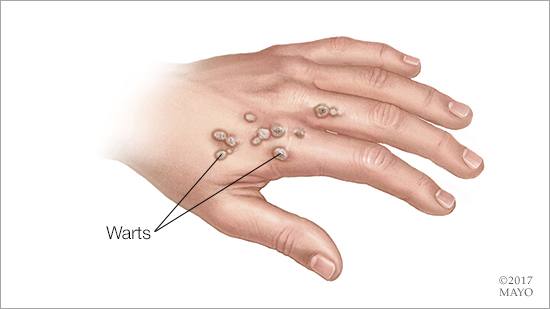-
Featured News
Mayo Clinic Q and A: Treating warts
 DEAR MAYO CLINIC: Can an untreated wart on my hand spread to another person? Is treatment for it necessary if it’s small and doesn’t bother me?
DEAR MAYO CLINIC: Can an untreated wart on my hand spread to another person? Is treatment for it necessary if it’s small and doesn’t bother me?
ANSWER: If left untreated, it is possible for warts to spread and for the virus that causes warts to be passed to another person. Fortunately, most adults have developed immunity to the viruses that cause warts. Because of this, it’s unlikely that an adult would develop warts as a result of contact with a person who has a wart. Children are more susceptible, however, because their bodies may not have built up immunity to the virus.
Warts are caused by human papillomavirus (HPV). The virus is quite common and has more than 100 types, which is why there also are so many types of warts. Some strains of HPV are acquired through sexual contact. Most forms, however, are spread by casual contact or through shared objects, such as towels or washcloths.
Over time, people develop immunity to most types of HPV that cause common warts. Their bodies are no longer affected by the virus, and it can’t take hold and grow. But it takes a long time for that to happen. As a result, warts are widespread in children and young adults because their bodies haven’t had enough time to become immune to this common virus.
When the virus does take hold, it grows a lump of thickened skin, which is the wart. The skin on a wart will shed over time, just as normal skin sheds. When it does, that skin carries the virus with it. If someone touches the shed skin — whether directly through skin-to-skin contact or indirectly, for example, on the floor of a swimming pool or a carpet, then the virus could spread. This occurs only if the shed skin enters a crack, scrape or other opening of someone who has not developed immunity to HPV.
When a wart begins to grow, HPV stimulates the skin to attract and grow its own blood supply and nerves, which makes the wart very hearty and less likely to go away on its own. Most warts will persist for one to two years if they are left untreated. Eventually, the body will recognize the virus and fight it off, causing the wart to disappear. While they remain, however, warts can spread very easily when people pick at them or when they are on the hands, feet or face.
The HPV vaccine Gardasil, which aims to prevent most types of cancer associated with HPV infection, also may prevent genital warts and possibly common warts. The Centers for Disease Control and Prevention recommends that all adolescents and teens ages 9 through 14 receive two injections of HPV vaccine at least six months apart. Teens and young adults who begin the vaccine series later (ages 15 through 26) should receive three doses of the vaccine.
Warts that are small and not bothersome don’t require treatment. If you don’t want to wait or if a wart is causing discomfort, over-the-counter remedies, such as salicylic acid, are available to treat warts.
Other options are available to treat larger, painful warts or warts that don’t respond to over-the-counter treatment. A dermatologist can offer additional options, which may include prescription antiviral creams, prescription therapies that irritate and eliminate warts, and medications that stimulate the immune system or disrupt the wart’s skin cell growth. Rarely, stubborn warts require minor surgery to cut away the tissue or laser surgery to remove the wart.
If you are an adult who never had problems with warts but they suddenly begin to develop, see your doctor and ask to be screened for an immune system disorder. Adults usually don’t have new-onset, common warts. But if numerous warts begin to appear, the immune system may be malfunctioning, in which case I recommend a prompt evaluation. — Dr. Dawn Davis, Dermatology, Mayo Clinic, Rochester, Minnesota







